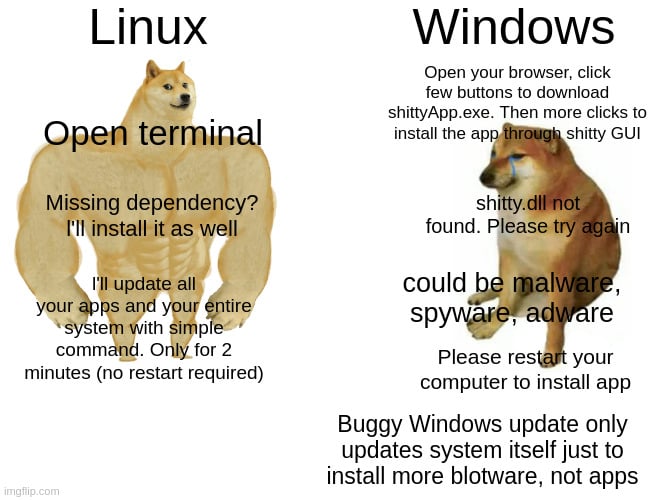this post was submitted on 23 Nov 2024
804 points (89.4% liked)
linuxmemes
21818 readers
4 users here now
Hint: :q!
Sister communities:
Community rules (click to expand)
1. Follow the site-wide rules
- Instance-wide TOS: https://legal.lemmy.world/tos/
- Lemmy code of conduct: https://join-lemmy.org/docs/code_of_conduct.html
2. Be civil
- Understand the difference between a joke and an insult.
- Do not harrass or attack members of the community for any reason.
- Leave remarks of "peasantry" to the PCMR community. If you dislike an OS/service/application, attack the thing you dislike, not the individuals who use it. Some people may not have a choice.
- Bigotry will not be tolerated.
- These rules are somewhat loosened when the subject is a public figure. Still, do not attack their person or incite harrassment.
3. Post Linux-related content
- Including Unix and BSD.
- Non-Linux content is acceptable as long as it makes a reference to Linux. For example, the poorly made mockery of
sudoin Windows. - No porn. Even if you watch it on a Linux machine.
4. No recent reposts
- Everybody uses Arch btw, can't quit Vim, <loves/tolerates/hates> systemd, and wants to interject for a moment. You can stop now.
Please report posts and comments that break these rules!
Important: never execute code or follow advice that you don't understand or can't verify, especially here. The word of the day is credibility. This is a meme community -- even the most helpful comments might just be shitposts that can damage your system. Be aware, be smart, don't fork-bomb your computer.
founded 2 years ago
MODERATORS
you are viewing a single comment's thread
view the rest of the comments
view the rest of the comments

Even if that’s needed, you can update apps w/o reboot usually (when sandboxed), and move opened files around (seriously wtf, Windows)…
When the hell would I need to update my Windows because of an app update? I only restart when there is a system update, which you have to do on Linux too if you want your kernel to stay up to date.
Well, it was what happened the last time I touched Windows in ‘22 (for work) – maybe a policy thing that a corporate app had elevated access and that’s why it forced a reboot on me for (some of the) “regular” app updates?
That's more likely.
Good to challenge misconceptions regularly, so thank you! :D
On that topic… I assume not being able to move opened files (my “go-to” use case was a PDF in Acrobat) is still unfixed though, right? Seems like that’d require a major OS and applications change to be made possible.
Why would you want to mv, not cp, a file that is actively opened by a file system. Is that even possible on Linux? I could swear I'm regularly blocked from manipulating things with open file descriptors.
Like tsugu said. Have a file open for editing or whatever and realizing you’d like it to go into another directory. Of course you could just wait until you’re done and then move, or close, move and re-open… but that’s less convenient (e.g. throwing away current file’s edit history) and/or a risk of forgetting to actually do it, at least for me, lol.
Not sure about Linux, but I grew up on Unix (macOS), which forces applications (at least GUI based ones, CLI apps do whatever they want) to be able to deal with this, so that’s why I expected Windows to be able to do that as well. Alas…
That I can confirm. Windows won't let me move files if any app is using them. I sometimes do it by accident when I'm editin an office document, realize it's in the wrong folder so I try to drag it to Documents. That won't work. But I got used to it pretty quickly.
Yes, true.
The whole "OS update when I want an app update" is because of how dependencies work on Linux. A library is installed once and referenced by any app that wants to use it. This way, an update in the library benefits all apps using it, as bugs het fixed. Also less storage is used when the one library is used by many apps.
Windows programs keep their own versions of a library and hard link to that one. That makes the app more flexible. You can copy the app and it's dependencies around and it will keep working. In this scenario multiple copies/versions of the same library can exist in the system, which takes more space.
Of course there is some nuance. Both operating systems can have/use shared or hard linked libraries, but this is the general gist of it.